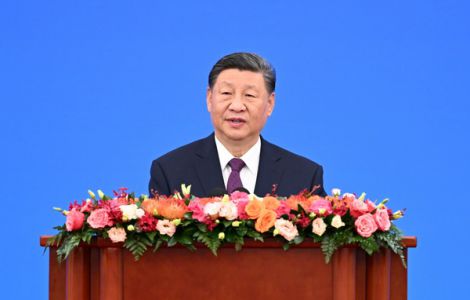中英对照:弘扬和平共处五项原则 携手构建人类命运共同体
Carrying Forward the Five Principles of Peaceful Coexistence and Jointly Building a Community with a Shared Future for Mankind
——在和平共处五项原则发表70周年纪念大会上的讲话
Address at the Conference Marking the 70th Anniversary of the Five Principles of Peaceful Coexistence
(2024年6月28日)
June 28, 2024
中华人民共和国主席 习近平
By H.E. Xi Jinping, President of the People’s Republic of China
尊敬的各位嘉宾、各位使节,
女士们,先生们,朋友们:
Distinguished Guests,
Diplomatic Envoys,
Ladies and Gentlemen,
Friends,
70年前,和平共处五项原则正式发表,成为国际关系史上的伟大创举,具有划时代的重大意义。今天,我们在这里隆重集会,纪念和平共处五项原则发表70周年,就是要在新形势下弘扬和平共处五项原则,携手构建人类命运共同体,为人类文明进步提供强劲动力。
Seventy years ago, the Five Principles of Peaceful Coexistence were officially initiated. It marked a groundbreaking and epoch-making achievement in the history of international relations. Today we gather here to commemorate its 70th anniversary for the purpose of carrying forward these principles under the new circumstances, building together a community with a shared future for mankind, and providing a strong driving force for human progress.
首先,我谨代表中国政府和中国人民,并以我个人的名义,对各位嘉宾和朋友的到来,表示热烈欢迎!
At the outset, on behalf of the Chinese government and people and in my own name, let me extend a warm welcome to all distinguished guests and friends present here!
在近现代人类社会发展的历史进程中,处理国与国关系,共同维护世界和平与安宁,促进全人类发展与进步,始终是各国不懈探索的重大命题。
In the course of the modern history of human society, handling well state-to-state relations, jointly maintaining world peace and tranquility, and promoting development and progress for humanity have always been big topics on the minds of all nations.
和平共处五项原则的创立是时代的呼唤、历史的选择。第二次世界大战结束后,民族独立和解放运动风起云涌,世界殖民体系土崩瓦解。同时,冷战阴云笼罩世界,“强权即公理”甚嚣尘上。刚刚获得独立的新生国家渴望维护国家主权、发展民族经济。新中国坚持独立自主,积极谋求同世界各国和平共处,努力改善外部环境尤其是周边环境。在此背景下,中国领导人首次完整提出互相尊重主权和领土完整、互不侵犯、互不干涉内政、平等互利、和平共处五项原则,并将其纳入中印、中缅联合声明,共同倡导将五项原则确立为指导国家间关系的基本准则。
The Five Principles of Peaceful Coexistence answered the call of the times, and its initiation was an inevitable historic development. In the wake of the Second World War, national independence and liberation movements swept across the globe, and the colonial system around the world crumbled and collapsed. At the same time, the world was overshadowed by the dark clouds of the Cold War and menaced by the rampant clamors that “Might is right.” Newly independent countries aspired to safeguard their sovereignty and grow their national economy. New China followed the principle of independence, actively sought peaceful coexistence with all countries, and endeavored to improve its external environment, especially in its neighborhood. Against this backdrop, the Chinese leadership specified the Five Principles in their entirety for the first time, namely, mutual respect for sovereignty and territorial integrity, mutual non-aggression, mutual non-interference in each other’s internal affairs, equality and mutual benefit, and peaceful coexistence. They included the Five Principles in the China-India and China-Myanmar joint statements, which jointly called for making them basic norms for state-to-state relations.
和平共处五项原则诞生于亚洲,迅速走向世界。1955年,20多个亚非国家出席万隆会议,在五项原则基础上提出处理国家间关系的十项原则,倡导团结、友谊、合作的万隆精神。20世纪60年代兴起的不结盟运动将五项原则作为指导原则。1970年第二十五届联合国大会通过的《国际法原则宣言》、1974年第六届特别联大通过的《建立新的国际经济秩序宣言》,都明确采纳五项原则。五项原则被相继载入一系列重要国际文件,得到国际社会广泛认同和遵循。
The Five Principles of Peaceful Coexistence were born in Asia, but quickly ascended to the world stage. In 1955, more than 20 Asian and African countries attended the Bandung Conference. They proposed ten principles for handling state-to-state relations on the basis of the Five Principles, and advocated the Bandung spirit of solidarity, friendship and cooperation. The Non-Aligned Movement that rose in the 1960s adopted the Five Principles as its guiding principles. The Declaration on Principles of International Law adopted at the 25th Session of the United Nations General Assembly (UNGA) in 1970 and the Declaration on the Establishment of the New International Economic Order adopted at the Sixth Special UNGA Session in 1974 both endorsed the Five Principles. With their inclusion in important international documents, the Five Principles have been widely recognized and observed by the international community.
70年来,和平共处五项原则跨越时空、超越隔阂,经久愈韧、历久弥新,成为开放包容、普遍适用的国际关系基本准则和国际法基本原则,为人类进步事业作出了不可磨灭的历史贡献。
Over the past 70 years, the Five Principles of Peaceful Coexistence have transcended time and space and overcome estrangement, showing robust resilience and everlasting relevance. They have become open, inclusive, and universally applicable basic norms for international relations and fundamental principles of international law. They have made indelible historic contributions to the cause of human progress.
注:为确保中英对照准确,“热词译”网站可能对中英文重新分段。

